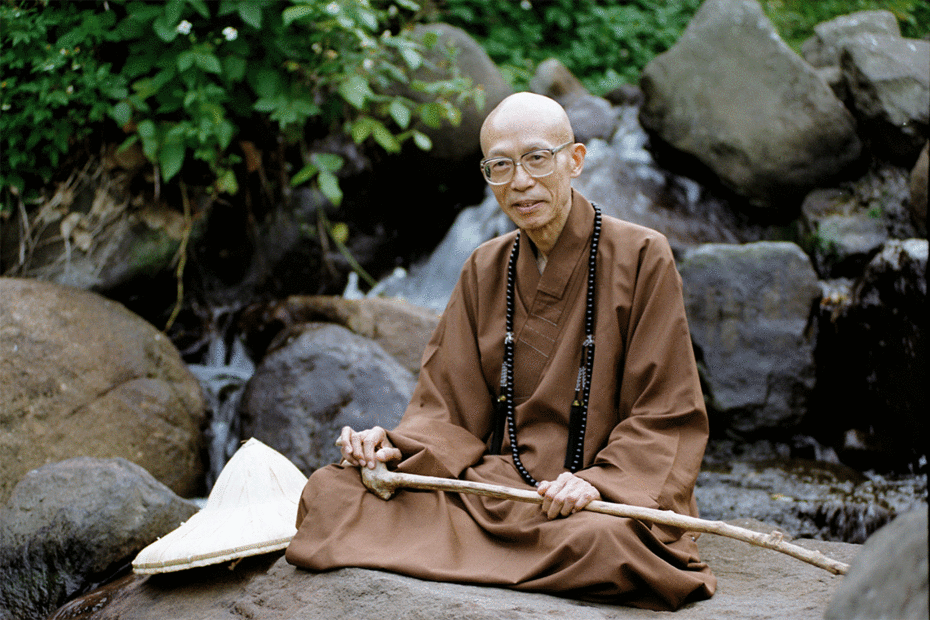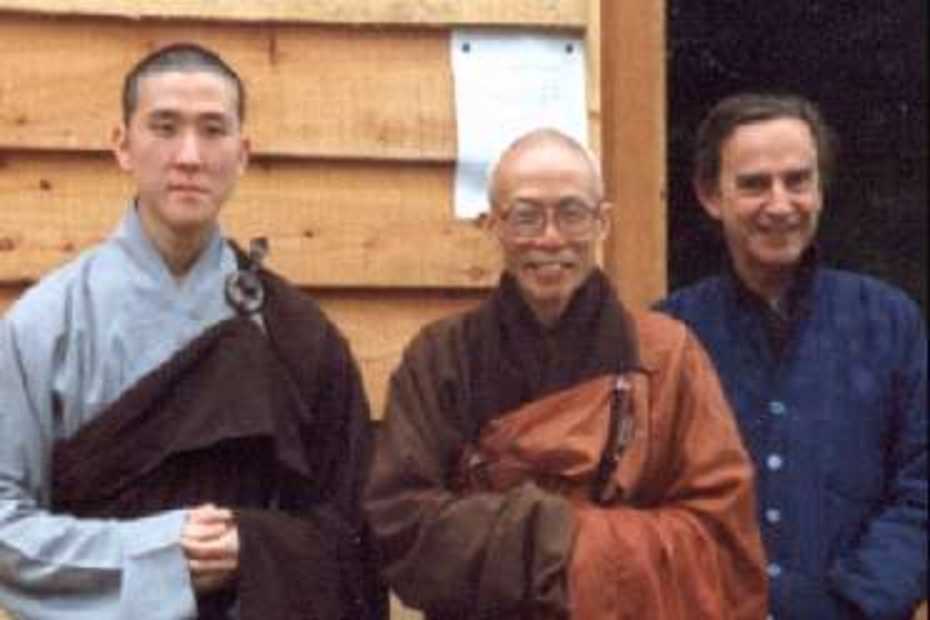Chan Master Sheng Yen

On this page
Teachings
Chan Master Shengyen was the Patron of the Western Chan Fellowship. He led retreats at Maenllwyd in Wales in 1989, 1992, 1995, and on his last visit to the UK in July 2000 he led a retreat for 60 people at Gaia House.
His teachings were recorded on each occasion, and the book Catching a Feather on a Fan contains the teachings from the 1989 retreat, and details of the retreat schedule, retreat reports by participants, etc.
The teachings from the 1995 retreat were published in New Chan Forum Issue 15. The book Illuminating Silence: The Practice of Chinese Zen contains the teachings from the 1989 and 1995 retreats, together with additional material by John Crook.
The talks from the 2000 retreat at Gaia House are available to download from Dharmaseed.
Master Sheng Yen with John Crook
Here is a picture of Master Sheng Yen at the end of the 1995 retreat at Maenllwyd, with John Crook on his left, and Ven. Guo Gu Shi on his right. (also see below for video of his visit to Maenllwyd).

Videos
There are some videos of Chan Master Sheng Yen on YouTube, and one includes footage from his last visit to Maenllwyd. The first listed have subtitles or commentary in English, but some of those lower down the page are in Chinese only.
Besides those linked below, there are more videos on youtube, for example search youtube for uploads by user shengyenfilm.
Pursuing a Perfect Character
Being a perfectionist causes one to be pretentious, frustrated, and unhappy. We should be true to ourselves and admit we're just ordinary people with many flaws, but try our best to grow and improve.
Introspection and Modification
We should not fear making mistakes or getting criticism from others, just keep going, and examine ourselves to discover our mistakes and correct them. This is the best way to further improve ourselves.
How to establish the right sense of direction and goal in life
In pursuing worldly goals, we shouldn't lose sight of our greater goal: peace of body and mind, a healthy character, and the happiness of others. This brings us closer to our ultimate goal, attaining Buddhahood.
How to pursue our goals
Aspirations for worldly success often lead to unrealistic goals. Instead, make noble and compassionate vows as the guiding principle to which you devote all your actions.
Buddhadharma can inspire the hidden potentials within us
People attempting to tap into their potentials may succumb to utilitarian gains. Only the Dharma will surely lead us to the cultivation of emotional balance, noble character, and ultimate wisdom.
The meaning and value of life
In countless lifetimes, we live up the consequences of our actions. To have true value and meaningful purpose in life, we can make compassionate vows to benefit others, rather than drifting life away.
The true meaning of confidence and the ways to build it
True self-confidence doesn't mean knowing everything. It means knowing what you know and what you don't know. Once you clearly know the extent of your knowledge and ability, you'll become confident.
How should we cultivate our true self, the happy self?
Know yourself-both strengths and shortcomings. We must mend our ways and be humble about our strengths while striving to improve ourselves.
Development of the self-self-affirmation through learning from others
Spiritual practice is a never-ending process of self-development: Avoid repeating the same mistakes of others or your own. And learn from other people's strengths.
Dharma Naming Ceremony for some WCF Group Leaders
The Old Drummer
2007 New Year Message
English Dubbing and Subtitles
Travelling
Chan Master Sheng Yen visiting various locations across the world, including Maenllwyd.
Dharma Drum Mountain
A video showing the complex he has built at Dharma Drum Mountain (Fa Gu Shan), Taiwan.
Interview
Interview (no translation from Chinese).
©Western Chan Fellowship CIO 2026. May not be quoted for commercial purposes. Anyone wishing to quote for non-commercial purposes may seek permission from the WCF Secretary.
The articles on this website have been submitted by various authors. The views expressed do not necessarily represent the views of the Western Chan Fellowship.
Permalink: https://w-c-f.org/Q354
